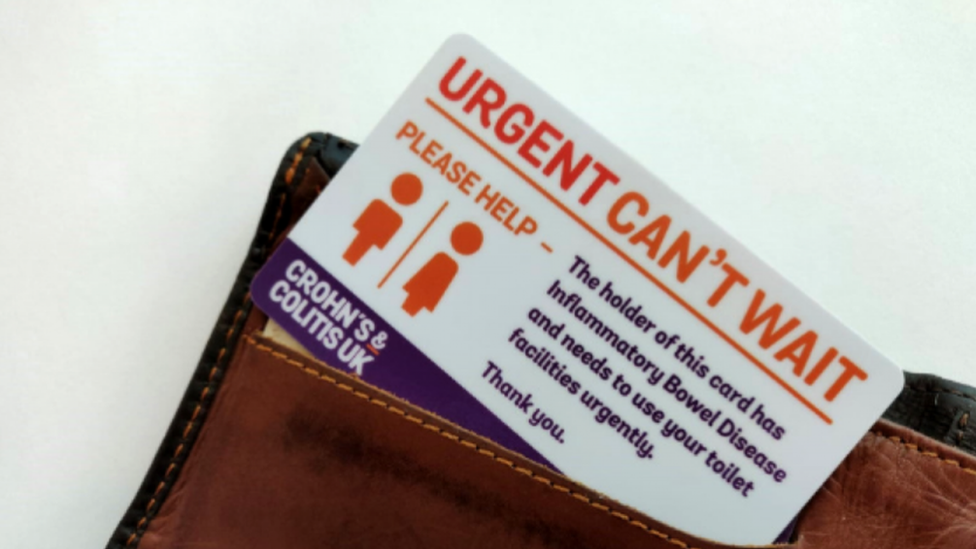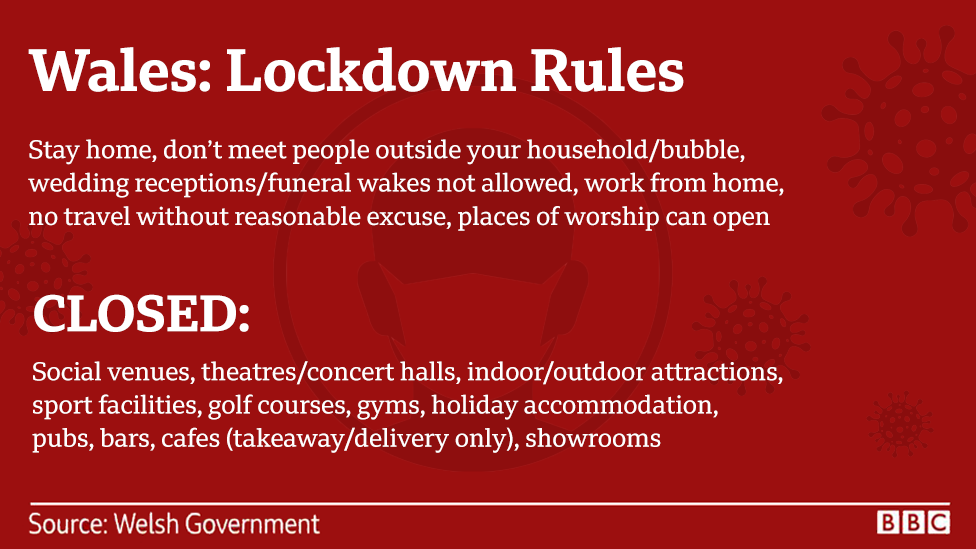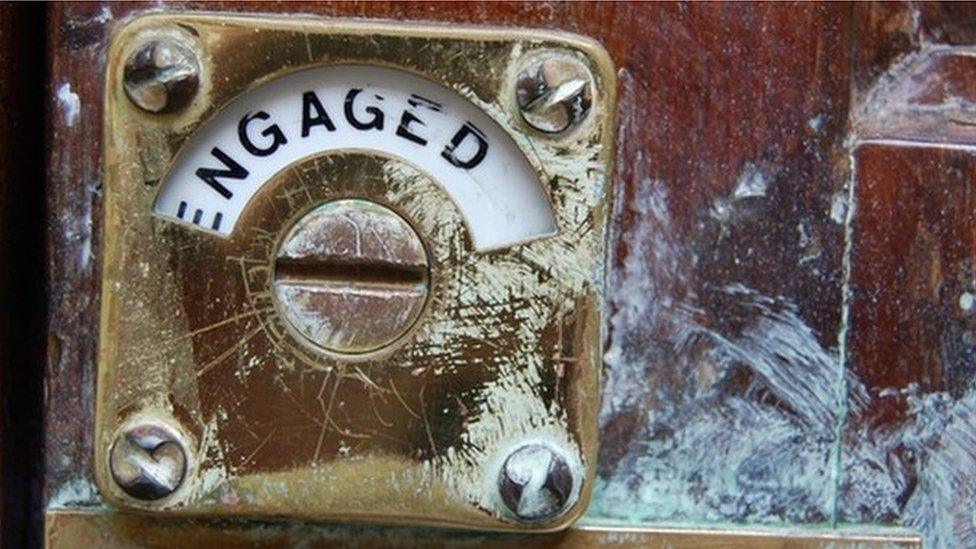Covid-19: Public loo closures 'debilitating and degrading'
- Published
'It's a horrible feeling... not being able to go'
"It can be so debilitating. It's a horrible feeling, needing the toilet and not being able to go."
Sianny Thomas, 34, is one of 23,000 people in Wales with Inflammatory Bowel Disease and she believes many councils did not consider people like her when they shut toilets during the pandemic.
Charity Huggard said it was also "degrading" for rough sleepers.
The Welsh Government said it recognised public toilets were important and it had issued guidance to councils.
While some local authorities have kept their public toilets open, others have opted to shut them to try to curb Covid-19.
People in Wales are currently required to stay at home and only mix with their household or support bubble, while only leaving their home for "essential reasons".

Sianny Thomas, 34, has Crohn's disease and MS
But Sianny feels public toilets are a necessity for people in her position when they need to leave the house within the restrictions.
"As someone with Crohn's, going out takes a lot of initial planning; you develop a 'mind map' of where all the loos are and where you can go," she said.
"With the toilets being shut this takes away a lot for people with medical conditions like mine, meaning they can feel more isolated."
She has been shielding since the initial lockdown in March 2020 because she has MS as well as Crohn's, but when the restrictions were temporarily relaxed last year she was able to go out for exercise and to go shopping.
"It's little things like knowing I can have a drink without the concern of needing the toilet and nothing being open," she said.

Sianny has a "Can't Wait" card which previously made it easier to ask to use toilets in shops, restaurants and other buildings
She added: "Conditions like mine are exasperated by stress, and it's a spiral for people, when they get stressed the condition worsens and they deteriorate, knowing the toilets were open would give people a lot of relief."
It can also be a problem for homeless people and parents with young children, Sianny added.
This was highlighted by a post on social media app NextDoor when a homeless man was forced to go to the toilet in Cardiff's Llandaff Fields after he said the facilities there were shut and he did not know what to do.
Richard Edwards, chief executive of rough sleepers charity Huggard, said public safety came first and keeping toilets open during the pandemic was difficult but he said the current stay-at-home order "ignores the fact that too many people don't have a home".
"Without public toilets or other accessible facilities, people who find themselves sleeping rough have no alternative but to relieve themselves in the street," he said.
"This is personally degrading and socially unacceptable."
Cardiff council said public toilets were closed to help limit the spread of Covid-19 and to encourage people to stay local, but they would be opened once it was safe to do so.
"These facilities are not staffed and as small enclosed spaces, social distancing measures are difficult to implement and enforce," a spokesman said.
"A lack of ventilation means the risk of airborne transmission is also a factor, as is the fact that the majority of these facilities lack the hot water necessary to maintain the appropriate level of hand hygiene, or cleaning regimes, needed to maintain public safety at this time."

Neil Greenway says he would go motorcycling most weekends before Covid-19, but he would always be thinking about the nearest toilet on the way
Neil Greenway, 60, who has irritable bowel syndrome (IBS), said there had to be a way of allowing toilets to remain open safely.
"I have been there where you are literally afraid to leave the house and have been absolutely miserable," said Mr Greenway, from Cardiff.
He said it was a "basic human necessity" which affected everyone.
"There are the lads that work in the refuse collection service, they are active from 6am till 9pm - where are the public toilets that they can access?
"And there are plenty of other jobs too that mean people would be out all day, where do they go?"
'Can't wait' card
Alison Reid, chief executive of the IBS Network, said even leaving the house for a local errand could be nerve-wracking for people with IBS if they were unsure about the nearest open toilet.
She said: "We provide members with a 'Can't Wait' card, but as public buildings, cafes and many public toilets and shops are closed, this considerably limits people's choices.
"People have shared with us that, in normal times, IBS is a very isolating condition and now they feel completely cut off and alone."

Emily Ellen Jones says public toilets remain essential to people who have to work and travel during lockdown
Emily Ellen Jones, 24, from Swansea was diagnosed with Crohn's disease when she was 12.
She said she understood why toilets were shut but felt councils and other organisations had not thought it through.
"People still have to work and travel, there are people going out for their one hour of exercise a day and they will need to use the toilet.
"You've been stuck in your house for ages feeling anxious and worried and then when you go out there are no toilets available, this then heightens it," she said.
A spokesman for Crohn's & Colitis UK said: "By locking public toilets you are preventing people who urgently and frequently need to poo from going outside to exercise, pick up their medication or shop for food for fear of having an accident in public.
"It is simply not acceptable to push people with chronic conditions like Crohn's and Colitis further into the shadows and heighten their isolation at a time when staying connected and healthy is harder than ever before."
Amber has a stoma after having her bowel removed
Of the 21 of the 22 Welsh councils who responded to the BBC's request for information, 11 said they were keeping toilets open.
Those which have chosen to close them include Cardiff, Denbighshire, Merthyr Tydfil, Newport and Rhondda.
Blaenau Gwent and Caerphilly councils do not run any public toilets.
While in Swansea, Conwy, Monmouthshire and Torfaen, some are open while others are closed and Powys only manages two, both of which are currently open.
Wrexham was the only council not to respond.
A Welsh Government spokesman said: "We recognise how important public toilets are to many people. Responsibility in Wales for opening and managing toilets for public use rests with the toilet owner or operator.
"We have provided guidance they should consider around the reopening and management of public toilets to minimise the spread of coronavirus."

- Published16 April 2019

- Published22 September 2019

- Published8 September 2019

- Published24 August 2015
